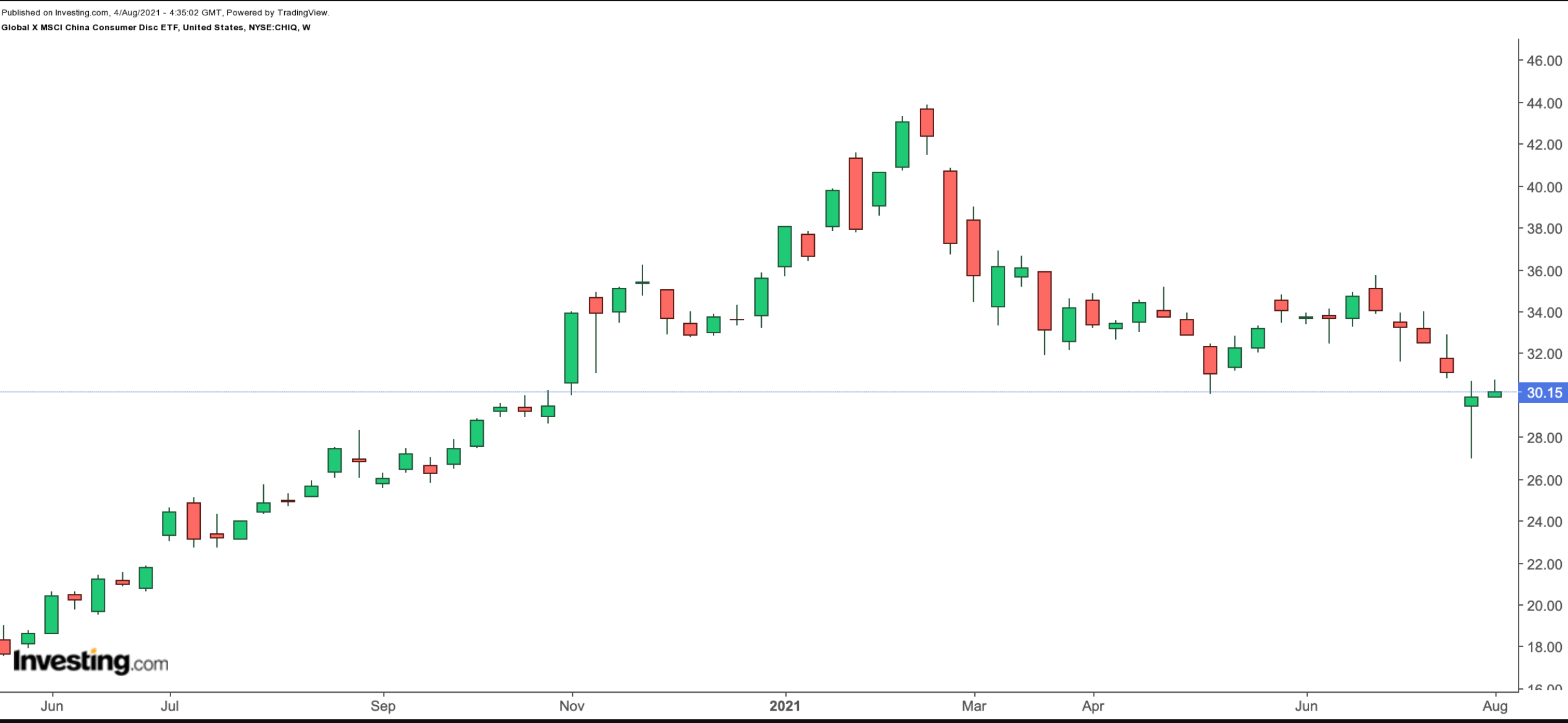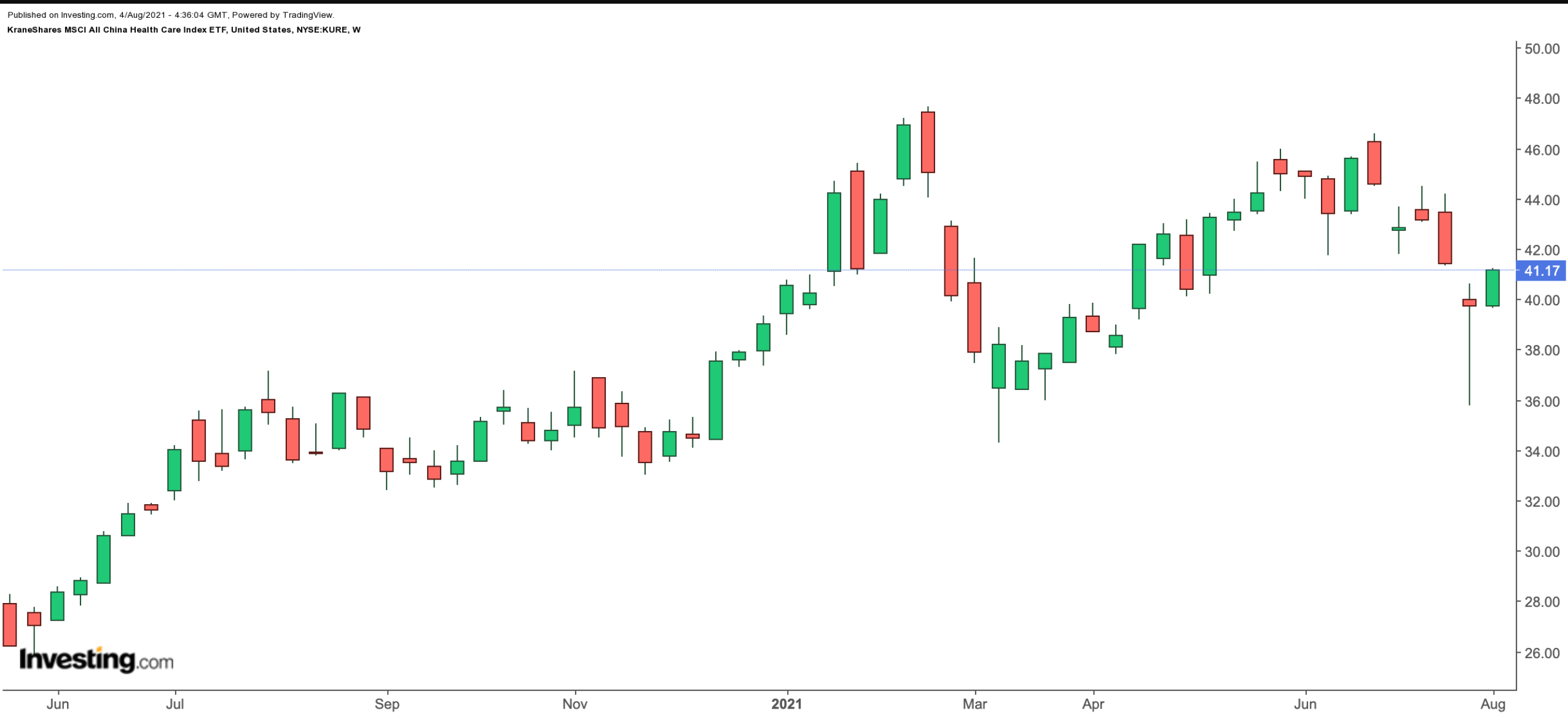Recent headlines from China highlight that authorities there are cracking down on ‘platform businesses’ amid antitrust violations. The businesses that have felt the heavy hand of regulation include big tech names and online education providers, whose operations have grown significantly during the pandemic.
According to Time, “The People’s Daily, the mouthpiece of the Communist Party, warned… that fighting alleged monopolies was now a top priority.” The government also cancelled the initial public offering (IPO) of financial technology (fintech) giant Ant, an affiliate of Alibaba (NYSE:BABA)—a stock we recently covered here. The State Administration for Market Regulation (SAMR) has fined over a dozen tech giants for violation of anti-monopoly laws.
As a result, the share prices of a large number of widely-followed Chinese stocks have given up their prior gains, especially in the early months of the pandemic. On a side note, Cathie Wood’s Ark Invest has also been abandoning Chinese tech names.
YTD, here’s how several of the big Chinese technology stocks have fared:
- Alibaba: down 14.2% YTD;
- Baidu (NASDAQ:BIDU: down 22.9% YTD;
- Didi Global (NYSE:DIDI): down 27.6% since going public in June:
- New Oriental Education & Technology (NYSE:EDU): down 88.3% YTD;
- Tencent (OTC:TCEHY): down 14.7% YTD.
Both the Shenzhen Composite index and the Shanghai Composite, are also down about 5% year-to-date (YTD). In other words, they have underperformed US benchmarks so far this year.
Despite the current headwinds and question marks, long-term investors in Chinese stocks realize that they are buying into the growth prospects of the world’s second largest economy after the US. Recent metrics for the first half of 2021 highlight, “the economy grew by 12.7 percent, amid a low base effect from last year's coronavirus-triggered slump.” Further data on economic activity shows that the Chinese economy is on the path to recovery from the effects of the pandemic.
Thus, many investors might want to invest in Chinese shares due to their lower valuations. On the other hand, others could decide to stay put until there is more clarity on what might be the next move by regulators in the country. Therefore, today we’ll introduce two exchange-traded funds (ETFs) for those who want to take a contrarian view and buy China-based companies.
1. Global X MSCI China Consumer Discretionary ETF
- Current price: $30.15
- 52-week range: $24.34 - $43.90
- Dividend yield: 0.07%
- Expense ratio: 0.65% per year
Our first fund, the Global X MSCI China Consumer Disc ETF (NYSE:CHIQ), invests in large and mid-capitalization (cap) consumer discretionary firms with products and services that consumers might want, but do not necessarily need, to purchase. As China’s middle class grows, such business are likely to benefit from increased spending levels.

CHIQ, which has 83 holdings, provides investment results that corresponds to the MSCI China Consumer Discretionary 10/50 Index. The fund started trading November 2009.
In terms of sectors, we see internet and direct marketing retail (32%), followed by automobile manufacturers (22%) and education services (12%). The top 10 names make up about 54% of net assets of 758 million.
Leading holdings include Alibaba, e-commerce groups JD.com (NASDAQ:JD) and Pinduoduo (NASDAQ:PDD), food delivery platform Meituan (OTC:MPNGY), and car manufacturers Nio (NYSE:NIO) and Byd (OTC:BYDDY).
Although CHIQ returned over 27% in the past 52 weeks, it is down almost 15% YTD. Long-term investors bullish on consumer-themed Chinese businesses could consider researching the fund further. However, it is important to remember that Chinese policy decisions could mean more choppiness for many of the names in the ETF.
2. KraneShares MSCI All China Health Care Index ETF
-
Current price: $41.17
-
52-week range: $32.40 - $47.69
-
Expense ratio: 0.65% per year
A recent report by McKinsey calls China “the most exciting healthcare story in the world right now.” The country spends 5.35% of its gross domestic product (GDP) on healthcare. By comparison, that number is 16.89% for the US, 11.43% for Germany, 10.95% for Japan, 10.00% for the UK, 5.56% for Romania, and 5.32% for Russia.
Our second fund, the KraneShares MSCI All China Health Care Index ETF (NYSE:KURE), gives exposure to the Chinese health care sector. Firms focus on pharmaceuticals, biotechnology, medical research, healthcare equipment, and supplies.

KURE, which has 116 holdings, measures the performance of MSCI China All Shares Health Care 10/40 Index. The fund started trading in January 2018. The top 10 names make up about 42% of net assets of 239 million.
Among the leading stocks in the roster are the provider of biologics services WuXi Biologics (HK:2269), Shenzhen Mindray Bio-Medical Electronics (SZ:300760), which manufactures medical imaging and diagnostic equipment, WuXi AppTec (SS:603259) which focuses on pharmaceutical research and development (R&D) and manufacturing, and Aier Eye Hospital Group (SZ:300015).
The fund returned 11% up in the past year and 2% YTD. If you believe China’s growing middle class, as well as its ageing population, could fuel the holdings of KURE in coming quarters, then you might consider buying the dips in the fund.
